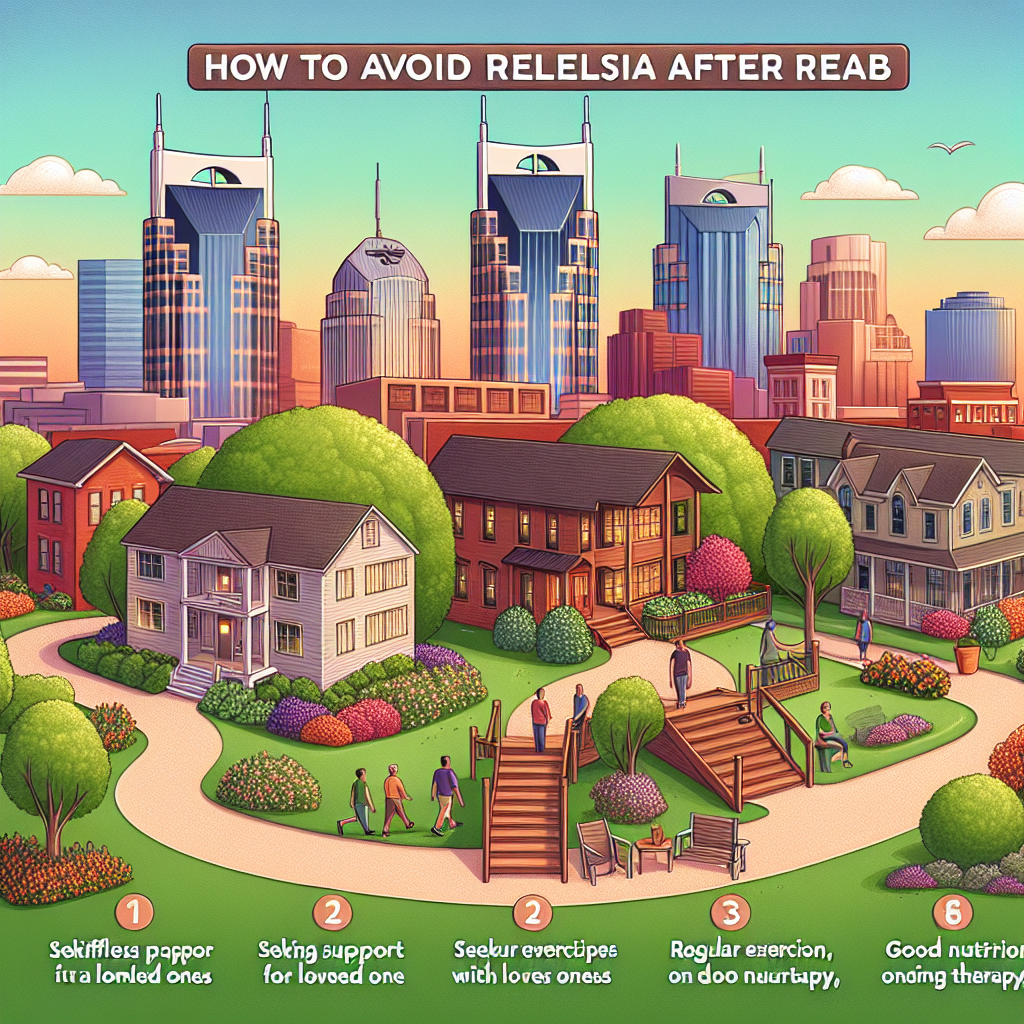-
Table of Contents

“Stay Strong, Stay Sober: Your Guide to Lasting Recovery in Nashville”
Introduction
Avoiding relapse after rehab in Nashville requires a comprehensive approach that includes ongoing therapy, support groups, lifestyle changes, and a strong support network. It’s crucial to develop a relapse prevention plan that identifies triggers and coping strategies. Engaging in local recovery communities, such as Alcoholics Anonymous (AA) or Narcotics Anonymous (NA), can provide essential peer support. Additionally, maintaining a healthy lifestyle through regular exercise, proper nutrition, and stress management techniques can significantly reduce the risk of relapse. Access to mental health services and continuous monitoring by healthcare professionals also play a vital role in sustaining long-term recovery.
Strategies for Maintaining Sobriety After Rehab in Nashville
Maintaining sobriety after rehab is a challenging yet rewarding journey, especially in a vibrant city like Nashville. The transition from a structured rehab environment to everyday life can be daunting, but with the right strategies, it is entirely possible to avoid relapse and build a fulfilling, sober life. One of the most crucial steps in this process is to establish a strong support network. Surrounding yourself with people who understand your journey and can offer encouragement is vital. This could include family, friends, or support groups such as Alcoholics Anonymous (AA) or Narcotics Anonymous (NA). Nashville has a thriving recovery community, and engaging with these groups can provide a sense of belonging and accountability.
Another essential strategy is to develop a routine that prioritizes your well-being. Structure can be incredibly beneficial in maintaining sobriety. Incorporate activities that promote physical, mental, and emotional health into your daily schedule. Exercise, for instance, is a powerful tool for recovery. It not only improves physical health but also releases endorphins, which can enhance your mood and reduce stress. Nashville offers numerous opportunities for outdoor activities, such as hiking in Percy Warner Park or biking along the Cumberland River Greenway, which can be both enjoyable and beneficial for your recovery.
In addition to physical activity, mindfulness practices such as meditation and yoga can be instrumental in maintaining sobriety. These practices help you stay present and manage stress, which is often a trigger for relapse. Nashville has several yoga studios and meditation centers where you can learn and practice these techniques. Furthermore, engaging in creative outlets like music, art, or writing can provide a therapeutic release and a constructive way to express your emotions.
It is also important to identify and avoid triggers that could lead to relapse. This might involve making significant changes to your lifestyle, such as avoiding certain places or people associated with your past substance use. Nashville’s vibrant nightlife can be tempting, but finding sober-friendly activities and venues can help you stay on track. Many local organizations host sober events and gatherings, providing a safe and supportive environment for socializing.
Another key aspect of maintaining sobriety is ongoing therapy or counseling. Continuing to work with a therapist can help you address underlying issues that may have contributed to your substance use. Cognitive-behavioral therapy (CBT), for example, can help you develop coping strategies and change negative thought patterns. Nashville has a wealth of mental health professionals who specialize in addiction recovery, making it easier to find the right support for your needs.
Moreover, setting realistic goals and celebrating your achievements, no matter how small, can boost your confidence and motivation. Recovery is a long-term process, and acknowledging your progress can help you stay focused and positive. Whether it’s reaching a milestone in your sobriety or achieving a personal goal, take the time to recognize and reward your efforts.
Lastly, staying informed and educated about addiction and recovery can empower you to make better choices. Attend workshops, read books, and stay connected with the recovery community to continually learn and grow. Knowledge is a powerful tool in preventing relapse and maintaining a healthy, sober lifestyle.
In conclusion, avoiding relapse after rehab in Nashville involves a combination of building a strong support network, establishing a healthy routine, practicing mindfulness, avoiding triggers, continuing therapy, setting goals, and staying informed. By implementing these strategies, you can navigate the challenges of post-rehab life and embrace a future filled with hope and possibility.
Building a Support Network to Prevent Relapse in Nashville
Building a support network to prevent relapse in Nashville is a crucial step for anyone who has completed a rehabilitation program. The journey to recovery is a continuous process, and having a strong support system can make all the difference in maintaining sobriety. One of the first steps in building this network is to reconnect with family and friends who are supportive of your recovery. These individuals can provide emotional support, encouragement, and a sense of belonging, which are essential for staying on track. It is important to communicate openly with them about your needs and boundaries to ensure that they can offer the right kind of support.
In addition to family and friends, joining local support groups in Nashville can be incredibly beneficial. Organizations such as Alcoholics Anonymous (AA) and Narcotics Anonymous (NA) offer regular meetings where individuals in recovery can share their experiences and offer mutual support. These groups provide a sense of community and understanding that can be invaluable during challenging times. Moreover, Nashville has a variety of specialized support groups that cater to different needs, such as groups for young adults, LGBTQ+ individuals, and veterans. Finding a group that resonates with your personal experiences can enhance the effectiveness of your support network.
Another important aspect of building a support network is to seek professional help. Therapists and counselors who specialize in addiction recovery can offer guidance and strategies to cope with triggers and stressors. They can also help you develop a relapse prevention plan tailored to your specific needs. In Nashville, there are numerous mental health professionals and clinics that focus on addiction recovery, making it easier to find the right fit for you. Regular therapy sessions can provide a safe space to discuss your progress and any challenges you may face, ensuring that you stay committed to your recovery journey.
Engaging in healthy activities and hobbies is another way to strengthen your support network. Nashville offers a plethora of recreational opportunities, from hiking in the beautiful Percy Warner Park to exploring the vibrant music scene. Participating in activities that you enjoy can help you build new, positive relationships and create a fulfilling lifestyle that supports your sobriety. Additionally, volunteering for local organizations or causes can provide a sense of purpose and connection to the community, further reinforcing your commitment to staying sober.
It is also essential to be mindful of your environment and make necessary changes to avoid potential triggers. This might involve distancing yourself from people or places associated with your past substance use. Creating a safe and supportive living environment can significantly reduce the risk of relapse. In Nashville, there are sober living homes and transitional housing options that offer a structured and supportive environment for individuals in recovery. These facilities often provide additional resources, such as job placement assistance and life skills training, to help you build a stable and independent life.
Lastly, practicing self-care and maintaining a healthy lifestyle are vital components of preventing relapse. This includes getting regular exercise, eating a balanced diet, and ensuring adequate sleep. Mindfulness practices such as meditation and yoga can also help manage stress and improve mental well-being. Nashville has numerous wellness centers and fitness facilities that offer classes and programs tailored to individuals in recovery.
In conclusion, building a support network in Nashville to prevent relapse involves reconnecting with supportive family and friends, joining local support groups, seeking professional help, engaging in healthy activities, creating a safe environment, and practicing self-care. By taking these steps, you can create a strong foundation for long-term sobriety and a fulfilling life in recovery.
Q&A
1. **Question:** What are some support groups available in Nashville to help avoid relapse after rehab?
**Answer:** Support groups such as Alcoholics Anonymous (AA), Narcotics Anonymous (NA), and SMART Recovery are available in Nashville to help individuals avoid relapse after rehab.
2. **Question:** How can maintaining a healthy lifestyle help in avoiding relapse after rehab in Nashville?
**Answer:** Maintaining a healthy lifestyle, including regular exercise, a balanced diet, and adequate sleep, can help manage stress and improve overall well-being, reducing the risk of relapse after rehab.
Conclusion
To avoid relapse after rehab in Nashville, it is crucial to establish a strong support network, including attending local support groups and therapy sessions. Engaging in healthy lifestyle changes such as regular exercise, balanced nutrition, and stress management techniques can also be beneficial. Additionally, creating a structured daily routine, avoiding triggers, and having a relapse prevention plan in place are essential steps. Utilizing local resources and staying connected with sober communities in Nashville can provide ongoing support and accountability.



